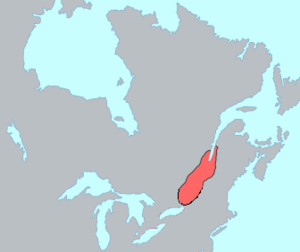Laurentian language facts for kids
Quick facts for kids Laurentian |
|
|---|---|
| Native to | Canada |
| Region | Saint Lawrence River Valley |
| Extinct | late 16th century |
| Language family |
Iroquoian
|
| Linguist List | lre |

Territory occupied by the St. Lawrence Iroquois, circa 1535
|
|
Imagine a language that was once spoken in Canada but isn't anymore! That's what Laurentian was. It's also called St. Lawrence Iroquoian. This language was part of the Iroquoian language family. People spoke it along the Saint Lawrence River in what is now Quebec and Ontario, Canada.
The Laurentian language disappeared around the late 1500s. This happened when the St. Lawrence Iroquoians people vanished. Many historians believe this was due to wars with stronger groups. One of these groups was the Mohawk, who were part of the Iroquois Confederacy from the south, in what is now New York state.
Contents
Exploring Laurentian History
The French explorer Jacques Cartier visited the area in 1535 and 1536. He saw about a dozen villages in the Saint Lawrence River valley. These villages were located between Stadacona (near modern Quebec City) and Hochelega (near modern Montreal).
Archaeologists have found other ancient villages further west. These are located near the eastern end of Lake Ontario. The St. Lawrence Iroquoians lived in these villages. Their homes were usually a few kilometers away from the Saint Lawrence River. Many villages were protected by strong wooden fences called palisades. Some of the larger villages could hold up to 2,000 people!
Why Did the Language Disappear?
When another explorer, Samuel de Champlain, arrived in 1608, he found no trace of the Iroquoians. These were the same people Jacques Cartier had met about 75 years earlier. Scholars have several ideas about why the St. Lawrence Iroquoians completely disappeared.
One idea is that terrible wars happened. The Mohawk from the south were very powerful. Another idea is that new diseases from Europe spread. These diseases could have wiped out many people. Some also think the Iroquoians might have moved to the Great Lakes region.
However, archaeological findings mostly suggest that devastating wars were the main reason. These wars were likely fought with other Iroquoian tribes. This included the Huron and the nations of the Iroquois League, especially the Mohawk.
Understanding Laurentian Words
Several different ways of speaking Laurentian might have existed. Jacques Cartier's notes from his trips are not complete. So, the Laurentian people might have spoken several distinct languages.
A few Laurentian words are still used today as place names. The most famous example is the word canada. In Laurentian, this word meant "village." Jacques Cartier used this word to describe both the region and the river that flows through it. That's how Canada got its name!
The name of Donnacona is also still used. He was the Iroquoian chief Cartier met at Stadacona. Today, there's a town called Donnacona in Quebec. The name Hochelaga is also still used in Montreal. It's part of the Montreal area called Hochelaga-Maisonneuve. Also, the alternate spelling "Osheaga" is the name of Montreal's yearly Osheaga Festival.
Laurentian's Place in Language Families
A linguist named Marianne Mithun studied the Laurentian words Cartier recorded. She concluded that Laurentian was definitely an Iroquoian language. She also found that the people who spoke Laurentian were in contact with other Iroquoian groups. These included the Huron and the Iroquois.
Laurentian Vocabulary Examples
In 1545, Jacques Cartier published a journal about his voyages. It included the first list of Laurentian words. Here are some examples of numbers and parts of the human body, just as Cartier wrote them:
| English (from French) |
Laurentian |
|---|---|
| one | segada |
| two | tigneny |
| three | asche |
| four | honnacon |
| five | ouiscon |
| head | aggourzy |
| eyes | hegata |
| ears | ahontascon |
| mouth | escahe |
| teeth | esgougay |
| tongue | osvache |
| village | canada |
Cartier also added a shorter list of words to his journal from his first trip. This list was published much later, first in Italian, then in English and French.
 | Delilah Pierce |
 | Gordon Parks |
 | Augusta Savage |
 | Charles Ethan Porter |

